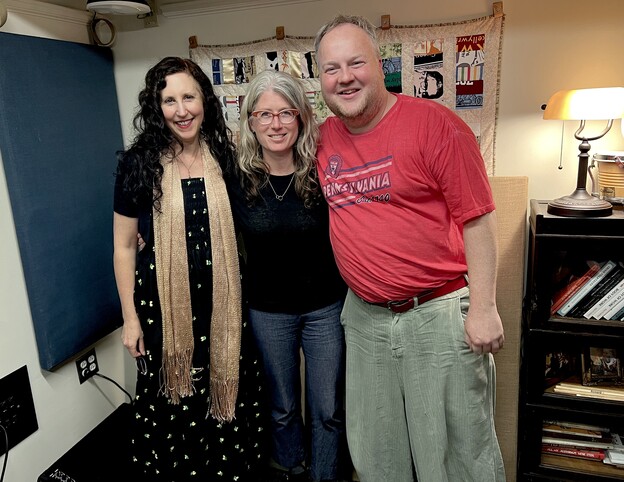Callie Gardner, "Culture Warrior"
 From left: Laynie Browne, Julia Bloch, Iain Morrison
From left: Laynie Browne, Julia Bloch, Iain Morrison
Julia Bloch, Laynie Browne, and Iain Morrison joined Al Filreis in KWH’s Wexler Studio to talk about a poem — or rather two versions of a poem — by the late Callie Gardner. One version, titled “when will my love return from the culture war?,” is 6-quatrains long. A second, for which we have a recorded performance, is four quatrains; there’s a variation on the second that seems to invite us to call it a sonnet. Callie added a version — organized in the quatrains — to their blog on May 1, 2020. On November 19, 2020, Callie read the shorter version of the poem as part of a live-streamed reading given by eight poets. Callie was the fifth to read. We link the YouTube recording HERE, and PoemTalk listeners are invited to watch and listen to our poem at 53 minutes into the group reading.
December 24, 2024
Emily Carr: Three new poems
She might be an American-born poet who lives and teaches in the United States, but I first became aware of Emily Carr during her time at the University of Calgary, so can’t help think of her, somehow, as a Canadian poet (these designations are so often arbitrary and rather fluid). She has been a finalist in seven national poetry competitions, most recently the National Poetry Series, and is the author of two trade collections — Directions for Flying, 36 fits: a young wife’s almanac (Furniture Press, 2010) and 13 ways of happily (Parlor Press, 2011) — as well as a number of poetry chapbooks, including & look there goes a sparrow transplanting soil (above/ground press, 2009) (reprinted in full in the anthology Ground rules: the best of the second decade of above/ground press 2003-2013), UP THE SHINBONE SUPERLATIVES (Horse Less Press, 2012), Resurrection Refrains: 22 Tarot Lyrics in the Form of the Yellow Brick Road (Dancing Girl Press, 2013) and STAY THIS MOMENT: THE AUTOPSY LYRICS, ACTS 1 & 2 (Little Red Leaves, 2013).